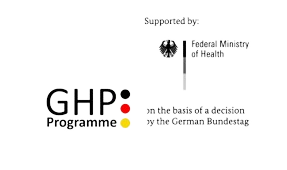The NiCaDe-IPC Project Phase I (2019-2022)
Project Title
Nigeria Centre for Disease Control: Capacity Development in Training of Infection Prevention and Control of Health Care Workers at Secondary and Tertiary Health Care Level
Duration
2019 – 2022
Partner Institutions
Nigeria Centre for Disease Control and Prevention (NCDC), Nigeria and Robert Koch Institute (RKI), Germany
Funder
Global Health Protection Program of the German Ministry of Health
Challenges addressed by the project
Health care-associated infections are one of the most common adverse events in health care delivery, but preventable through effective infection prevention and control (IPC) measures. Numerous studies have shown that sustainable improvement of IPC practices in hospitals is hard to achieve. IPC trainings working merely with fact-based communication of technical content and demonstrations of the “right” behavior do not yield the desired result. Improving IPC in health facilities is a systemic challenge and requires direct involvement of local actors for long-term success and sustainability.
NICADE - IPC
Project Objectives
One
The overall goal of the NiCaDe project is to support NCDC’s mandate to prevent and manage disease outbreaks. The IPC sub-project aimed to build up training capacities for infection prevention and control at NCDC and in four geopolitical zones of Nigeria.
Two
WHO recommends using multimodal strategies and a participatory approach for IPC improvement. However, a global IPC survey found that fewer hospitals in low-resource settings reported implementation of multimodal strategies and effective training approaches with a participatory and behavioral change focus were severely lacking.
Three
Addressing these gaps in Nigeria, NCDC and RKI developed a training programme enabling and empowering health care workers (HCW)s and health facility leadership to lead IPC quality improvement activities in their health facilities. The approach focuses on enabling skills and acknowledges concrete working realities and IPC infrastructure on the ground which differ from hospital to hospital.
Overview of Activities
These provide a concise summary or high-level perspective of the various tasks, actions, or events that are currently in progress, planned, or have taken place within the project.
In 2019, experts from NCDC and RKI developed a training approach that looks at IPC through a social lens and considers the organizational and systemic aspects of IPC improvement: the “Participatory Approach to Learning in Systems – PALS”. The training approach is based upon theoretical concepts of inquiry learning and practiced thoroughly as a participatory approach. Elements of “Theme-Centered- Interaction” (TCI) are incorporated into the training approach in order to display the influencing factors for IPC and to reflect a systemic view. In this way, health care workers are trained in competencies, techniques and attitudes for promoting change, to be able to initiate and promote IPC improvement. To build up training capacities in Nigeria, selected IPC experts and educationalists were trained as “PALS Trainers”. They themselves in turn trained and mentored teams of health care workers to be “Change Agents” for IPC improvement in their health facilities.
In July 2019, 22 future trainers started their training programme with a two-week full-time basic IPC course at the College of Medicine at University Lagos covering the medical-technical aspects of infection prevention and control. Subsequently, they conducted an IPC risk assessment as a field assignment in their work setting. The first module of PALS training for trainers took place in November 2019 and in January 2020 with two workshops in Abuja, and an intermediate field phase. This part of the training focused on the HOW of change processes: How can IPC be put into practice? How can change processes, which address local needs and conditions, be activated? Theoretical and practical sessions were combined to train communication, participation, systemic perspectives and team building. At the same time, the training supported the to-be trainers to shift from the perspective of IPC implementation to that of teaching, and to take first steps in their future role as trainers.
In March 2020, due to the COVID-19 outbreak, project activities were adapted to support the outbreak response in Nigeria: the project team at NCDC helped different sectors of the Nigerian health system to develop IPC protocols and guidelines and travelled across the nation to facilitate IPC trainings. The engagement with the newly trained PALS trainers continued with a series of webinars that focused on the application of PALS competences to prevent COVID 19 transmission in the immediate working environment of the participants. In September 2020, trainers deployed to act as trainers for the first time. They trained over 250 IPC focal persons of secondary health facilities in COVID-19 IPC trainings that included PALS elements and considered behavioral change, and thereby gained their first trainer experience.
In 2021 the implementation of the PALS training programme resumed with a “refresher workshop” for trainers in Abuja in July, that allowed for reflection on the experience acquired during the COVID-19 response and ensured continuation to the learning process. Trainers prepared the Change Agent trainings in state teams with the support of the project team. Recognizing the importance of leadership support for IPC improvement processes in health facilities, medical directors and chief medical directors participated in a PALS introductory workshop and were further involved in the programme during CA trainings and through advocacy visits. The Change Agent training consisted of two workshops with an intermittent field phase, followed by a 6-month mentoring period. Workshops were implemented in the autumn of 2021 in Edo, Ondo, Ebonyi and FCT. Ninety-two health workers of 23 health facilities were trained by PALS trainers (under expert advice and supervision of the project team).
Throughout the practice phase (January – July 2022), PALS trainers mentored the Change Agents and supported them in the application of PALS and implementation of IPC improvement activities in health facilities. The trainers in turn were mentored by the project team. The training of trainers concluded with a workshop for assessment and certification of 19 trainers in July 2022. The Change Agent training was completed in September 2022 with closure events in the participating states.
Throughout the whole project period, data documenting the training development and training implementation (of Trainers, Medical Directors and Change Agents), as well as the learning process of trainers and the IPC improvement activities in health facilities were collected to inform the monitoring and evaluation of the project. In September 2020, a baseline IPC assessment (IPCAF) was conducted in all participating health facilities. A qualitative study by an external researcher was conducted to contribute additional evidence from an outside perspective.

Results
The evaluation of the trainings as well as of the hospital practice showed that trainers developed competencies to train and mentor health workers in PALS and that IPC improvement activities were conducted in all participating hospitals. This included conducting step-down trainings, reinforcing IPC teams and IPC committees, establishing water and/or electricity provision, renovating laundry units and purchasing washing machines, improving waste management what included the construction of infrastructure. No additional funding was provided to the health facilities by this project. The majority of the activities were carried out in a participatory, collaborative manner by the training participants together with their colleagues and their Medical Directors/Chief Medical Directors. This project not only strengthened IPC training capacity in Nigeria, but also made a concrete contribution to IPC improvement in Nigerian hospitals.
Conclusion & Continuation
The project team has successfully piloted a specific application example of an IPC training programme that is “team- and task-based”, “participatory”, and “mutlimodular”, as recommended by WHO. Furthermore, including the systemic view to the training programme, PALS stimulates the tailored collaboration between health care workers and leadership towards feasible solution for local IPC challenges. The evaluation results revealed that the training programme encouraged participating health professionals to initiate concrete IPC change processes in practice. Based on the experience of applying PALS in Nigerian health facilities and lessons learned from the COVID 19 IPC intervention, NCDC intends to use the PALS approach and training programme as the basis for nationwide IPC training in Nigeria and integrate it into the national IPC strategy. The second project phase from 2023 to 2023 (NiCaDe II) supports the consolidation of the approach in Nigeria.

